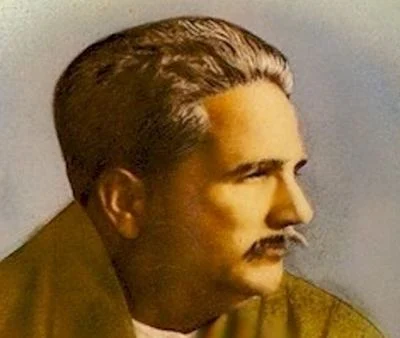
Nietzsche’s philosophy of the “superman” also influenced Iqbal’s concept of the “khudi” or self. Henri Bergson’s concept of “elan vital” also influenced Iqbal’s philosophy
Shoukat Lohar
Renowned Urdu and Persian poet Allama Mohammad Iqbal, who was bestowed with the title of Sir by the colonial British rulers, and who wrote the famous poem ‘Sare Jahan Se Achha, Hindustan Hamara’, and was declared as ‘Shair-e-Mashriq’ (The Poet of the East) by the Muslims of this region, and “Mufakkir-e-Pakistan,” which means the “Philosopher of Pakistan,” was born on November 9, 1877, in Sialkot, Punjab, British India (now in Pakistan).
Iqbal’s work has been influenced by several thinkers and scholars, including Sir Thomas Arnold, Friedrich Nietzsche, and Henri Bergson. Sir Thomas Arnold, a British scholar introduced Iqbal to the Western philosophical tradition. Nietzsche’s philosophy of the “superman” also influenced Iqbal’s concept of the “khudi” or self. French Philosopher Henri Bergson’s concept of “Elan Vital” also influenced Iqbal’s philosophy. Élan vital is a term coined by French philosopher Henri Bergson in his 1907 book Creative Evolution, in which he addresses the question of self-organization and spontaneous morphogenesis of things in an increasingly complex manner.
Iqbal’s poetry has left an indelible mark on the hearts and minds of people, not only in Pakistan but all over the world. His work was not only limited to poetry but also extended to philosophy and political ideology.
Iqbal’s literary work consists of Urdu and Persian poetry, which has been compiled in various books. Some of his famous books include “Bang-i-Dra,” “Asrar-i-Khudi,” “Rumuz-i-Bekhudi,” “Zarb-i-Kalim,” and “Payam-i-Mashriq.”
These books contain a collection of his poetry that has inspired and touched the hearts of people for over a century. The message conveyed through Iqbal’s poetry is one of self-realization and self-actualization. He emphasized the importance of the individual and the role they play in shaping society.
His poetry promotes the idea of self-reflection and introspection, urging individuals to seek their true selves and find their purpose in life. Iqbal’s philosophy also advocates for the unity of the Muslims and the revival of Islamic values.
Despite his profound impact on Urdu and Persian literature, Iqbal’s poetry is often regarded as being philosophical but confusing. This perception stems from the fact that Iqbal’s work was not limited to mere poetry, but also contained a deep philosophical underpinning. His poetry often references concepts from Islamic mysticism and philosophy, which can be challenging for readers who are not well-versed in these topics. However, with a deeper understanding of these concepts, Iqbal’s poetry becomes more accessible, and its message becomes clearer.
Iqbal’s poetry has been translated into several languages, including English. The translations help to bring his message to a broader audience, making his work accessible to non-Urdu and non-Persian speakers.
One such translation is “The Secrets of the Self,” which is an English translation of “Asrar-i-Khudi.” This book contains a collection of Iqbal’s poems, which have been translated into English by R. A. Nicholson.
Another translation is “The Call of the Marching Bell,” which is an English translation of “Bang-i-Dra.” This book contains a collection of Iqbal’s poems that have been translated into English by M. Hadi Hussain.
His Shikwa and Jawab e Shikwa
Shikwa and Jawab-e-Shikwa are two powerful poems written by the famous Urdu poet and philosopher, Allama Iqbal.
These poems are considered as two of the most iconic works of Urdu literature, and they have had a profound impact on the literary and cultural landscape of South Asia. Shikwa, which means “complaint,” was written by Iqbal in 1909.
In this poem, Iqbal expresses his frustration with the state of affairs in the Muslim world, particularly in India. He laments the loss of Muslim power and influence, and he criticizes the Muslim community for their lack of unity and commitment to their faith.
The poem begins with Iqbal addressing the God, asking why the Muslim community has been reduced to such a state of powerlessness and despair.
He then goes on to describe the various problems facing the Muslim world, including poverty, ignorance, and oppression.
Iqbal also criticizes the Muslim leadership, whom he sees as corrupt and selfish.
Despite its critical tone, Shikwa ends on a note of hope. Iqbal reminds his readers that God is merciful and compassionate, and he urges the Muslim community to turn to Him for guidance and strength.
Jawab-e-Shikwa, which means “answer to the complaint,” was written by Iqbal in response to Dhikwa. In this poem, Iqbal takes on the role of God, answering the complaints and criticisms expressed in Shikwa.
The poem begins with Iqbal acknowledging the frustrations and difficulties faced by the Muslim community.
He then goes on to explain that these problems are the result of the Muslims’ own actions, rather than any external forces. Iqbal argues that the Muslim community has lost its sense of purpose and commitment to its faith, and he calls on them to renew their dedication to Islam.
Throughout Jawab-e-Shikwa, Iqbal emphasizes the importance of individual responsibility and action. He argues that it is up to each individual Muslim to take charge of their own destiny and work towards building a better future for themselves and their community.
Both Shikwa and Jawab-e-Shikwa are powerful and thought-provoking poems that continue to resonate with readers even today.
__________________
 Shoukat Lohar is Assistant professor in English at Mehran University of Engineering and Technology Jamshoro. He can be reached at Shoukat.ali@faculty.muet.edu.pk
Shoukat Lohar is Assistant professor in English at Mehran University of Engineering and Technology Jamshoro. He can be reached at Shoukat.ali@faculty.muet.edu.pk